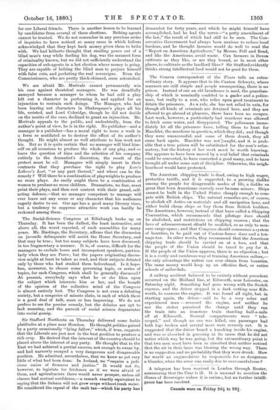The Geneva correspondent of the Times tells an extra- ordinary
story. It appears that in the Canton Schwytz, where manners are still simple and people unsuspecting, there is no prison. Instead of one an old farmhouse is used, the guardian- ship of which is nominally confided to a gaoler and a police- man, but really to a nun, who relies upon good treatment to detain the prisoners. As a rule, she has not relied in vain, for though all kinds of criminals are detained here, and they are allowed to go abroad at pleasure, there have been no escapes. Last week, however, a particularly bad murderer was allowed to fetch some water, and disappeared. The policeman imme- diately let all the prisoners loose, telling them to hunt for Maechler, the murderer in questicn, which they did ; and though they were unsuccessful, and some of them drunk, they all came back again. Maechler was not ,caught, and it is prob- able that a true prison will be substituted for the nun's refor- matory, but the history of her work must be worth knowing. She appears to have been moved by a real belief that criminals could be converted, to have converted a good many, and to have brought all under some sort of discipline. Otherwise, the neigh- bourhood would have protested.


































 Previous page
Previous page